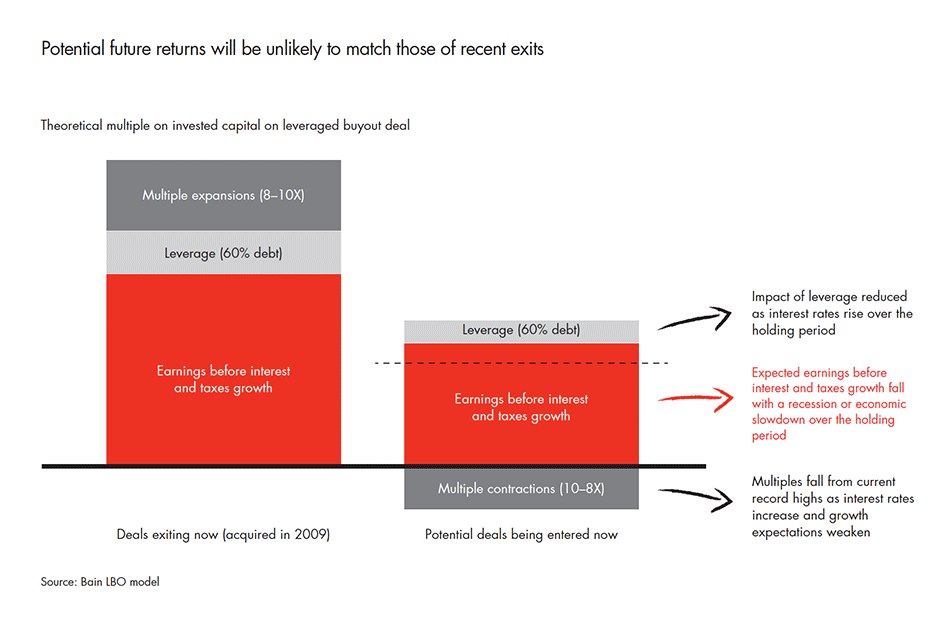Forbes.com
This article originally appeared on Forbes.com.
With record amounts of capital in private equity firms’ hands waiting to be deployed into new investments, PE funds must put dry powder to work, notwithstanding today’s uncertain economic outlook. But investing at current high acquisition prices while facing the mounting prospect of a downturn requires special care and discernment. As we point out in Bain & Company’s recently released Global Private Equity Report 2016, three common features of a recession—declining EBITDA, a tougher credit environment and shrinking deal multiples—point to the potential for major compression of returns on PE transactions made today (see figure).

1. Look for businesses that can shift their growth trajectory.
Of the many ways PE firms can boost growth of the companies they acquire, the simplest is to rev up the company’s core business by increasing its market share or by taking other steps that enable it to outpace its competitors in order to beat priced-in expectations. As growth stalls across the economy during a downturn, general partners (GPs) will need to broaden the growth potential of their portfolio companies by seeking out ways to expand the markets in which they compete. That is what Bain Capital, The Carlyle Group and Thomas H. Lee Partners did with Dunkin’ Brands Group, the quick-service restaurant chain they co-owned, following the 2008 recession. Although Dunkin’ Donuts outlets were plentiful and strong across New England, they recognized that the brand was underrepresented across the rest of the country, where Starbucks outlets dominated. Seeing an opportunity for Dunkin’ Donuts to occupy a strong No. 2 position as a national brand, they took advantage of the business’ limited cyclicality—that people continue to buy their morning coffee, recession or not—and the PE owners aggressively expanded Dunkin’ stores. The strategy worked, and the owners took the business public in 2011 at a valuation of $2.4 billion—some 60% more than its enterprise value at acquisition.
2. Use your due-diligence process to ferret out operational improvements that can generate a significant earnings boost.
Anticipating stronger economic headwinds, forward-looking PE firms are deepening their operational due diligence to bring rigor to their evaluation of a target’s cost structure and cash position. When managing assets in recessionary times, the best of all possible outcomes is to capture the benefits of both cost reductions and growth. That’s what Montagu Private Equity, a London-based European buyout firm, did during the last recession with its portfolio company, BSN Medical, a specialist in the low-growth businesses of compression therapy, wound care and orthopedics products. Montagu bought BSN in 2006. Seeing the 2008 downturn as an opportunity to roll up smaller competitors in these markets it served and also move into new territories, Montagu helped BSN Medical to buy growth while cutting costs. When Montagu sold BSN in 2012 to the Stockholm-based PE firm EQT Partners, BSN’s revenues had increased by 40%, but EBITDA jumped by 80% on the back of cost reductions.
3. Seek out companies in sectors well positioned to ride out a downturn.
An economically grounded due-diligence process will surface companies in industries like pharmaceuticals and utilities that are resistant to—or even prosper during—cyclical downturns, but competition for them keeps their acquisition prices high. However, a deeper dive can also uncover counter-cyclical pockets of opportunity for companies that normally feel the effects of a business contraction. CVC Capital Partners, the Luxembourg-based global buyout firm, made a smart countercyclical play ahead of the last recession when it bought 206 outlets of Matas, a Danish health and beauty aids retailer, in early 2007. Because people get sick in good and bad economic times and continue to indulge in beauty products during downturns, Matas benefited from very little downside exposure when a recession hit later in the year and rode out the slump with its core business intact. CVC consolidated sourcing and purchasing to gain operating efficiencies that helped boost margins. As the economy recovered, Matas built on the advantages it had nurtured through the downturn, raising sales of its popular store-brand cosmetics lines by developing the largest customer-loyalty program in Denmark and by expanding into online sales. Under CVC’s ownership, Matas strengthened its leadership position as Denmark’s largest health and beauty aids retailer.
PE firms that have felt recessions bite have learned from hard experience that, during economic expansions, it is wise to be a bit paranoid about how long good times will last. The cost of spending a little time bolstering your current holdings and getting new deals right is not nearly as high as trying to rescue investments when it may be too late.
Hugh MacArthur, Graham Elton, Dan Haas and Suvir Varma are leaders of Bain & Company’s Private Equity Group.
Carl Evander is a principal in Bain’s Private Equity Group.
